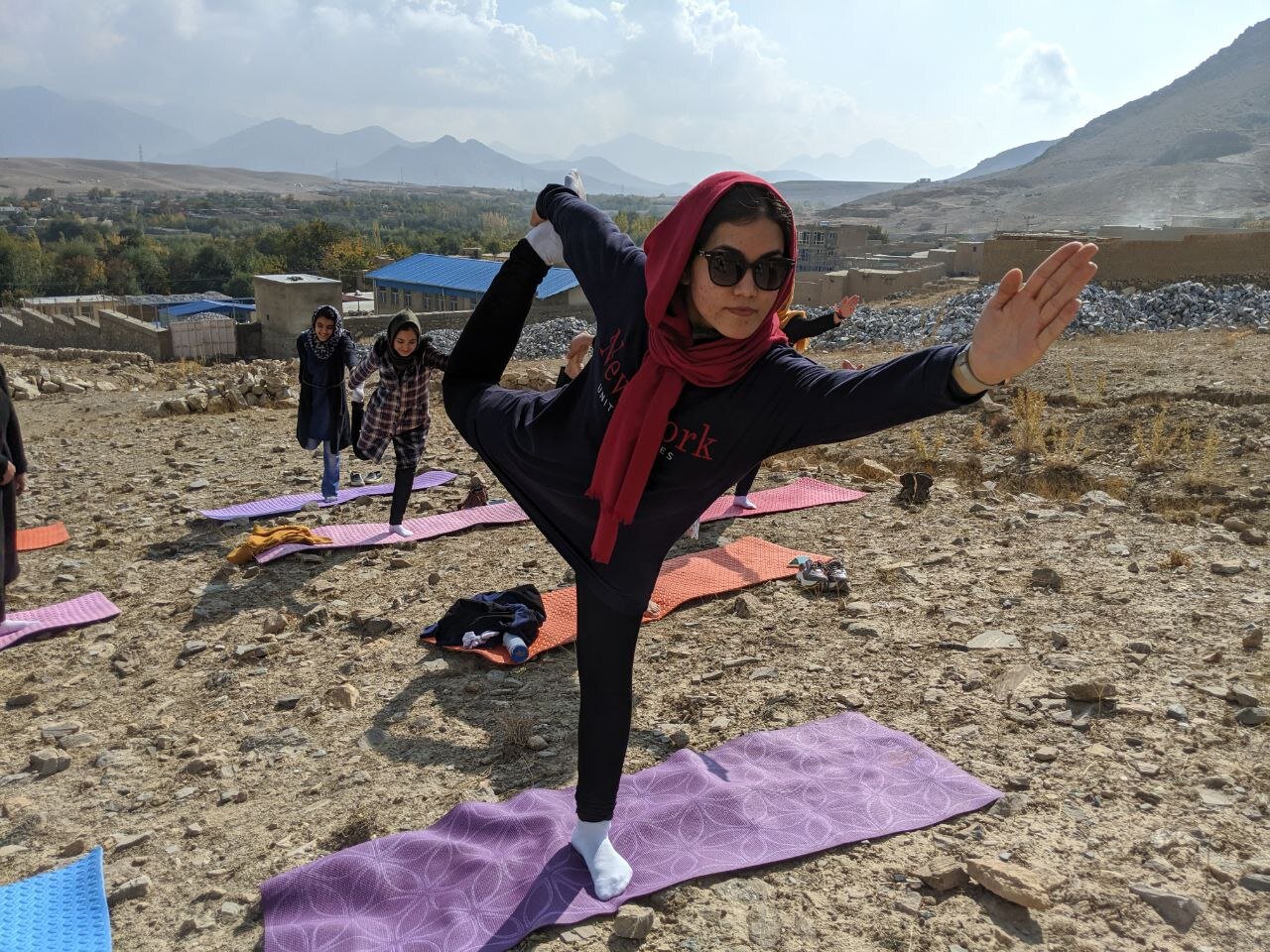The mother-daughter duo behind Afghanistan’s first all-female yoga studio
Fakhria and Froohar Momtaz are using yoga to help Afghan girls and women.
When Fakhria Momtaz opened the Momtaz Yoga Center, Afghanistan’s first all-female yoga studio, her teenage daughter Froohar remembers feeling overwhelmed with pride and gratitude.
“There is a lack of confidence in Afghan girls,” says 17-year-old Froohar. “They need somewhere to increase their confidence and relax themselves. I’m really thankful for my mom.”
Coming from a family of athletes, Fakhria was practising yoga before she even knew what the word meant. She started studying yoga in earnest as an adult and worked to incorporate it into her personal and professional life.
At home, Fakhria began teaching Froohar the ancient discipline when her daughter was 7 years old. At the web host company Fakhria founded with her husband, she would lead informal yoga lessons for female employees, pushing back desks during lunch or after work. When she saw how much Froohar and her employees enjoyed yoga, Fakhria decided to expand her classes to reach more girls and women in Kabul. In 2016, she opened the Momtaz Yoga Center.
Coming from a family of athletes, Fakhria was practising yoga before she even knew what the word meant. (Courtesy of Fakhria Momtaz)
“There is no other place for women to feel comfortable, to have a safe place and to feel better and have a space for gathering with each other,” Fakhria says of Momtaz Yoga Center. She and Froohar lead free yoga, therapy, meditation and wellness classes for Afghan girls and women at the centre. After completing secondary school last year, Froohar has also been assisting with administrative work before she begins university. “When my mom is abroad, when she’s on a business trip, I’m trying to cover for her as a supervisor,” she shares.
The mother-daughter duo believe that Afghan girls and women have a lot to gain from yoga. “We have a high-level of violence in Afghanistan,” says Fakhria. “Domestic, social and even political violence we have against women here in our country. Many feel our classes help them mentally. It is a way of healing for women, from both the past and the present.”
Froohar sees the changes in her students immediately after class. “One hour before yoga and one hour after yoga can be completely different,” she reflects. “They come with some anger or with some stress. When we end the class, they are smiling, they are more relaxed than they are before.”
Working in a female-only space comes with its perks. Froohar enjoys being able to take off her scarf and cool off her hair in front of the air conditioner when the weather gets hot. She also likes learning from the older women who work there.
During one memorable conversation with one of the centre’s cleaners, Froohar learned that her colleague was married at the age of 13 against her wishes and that her husband was forced into the marriage as well. Before their conversation, Froohar didn’t realise that family and societal pressures affected men in addition to women.
While Froohar loves helping her mother at the Momtaz Yoga Center, she also wants to be able to assist her dad with the family’s web host company. That’s part of the reason Froohar is studying computer science at university this year. Through her degree, she also hopes to challenge the belief that girls can’t pursue careers in tech. “I’m just wanting to break the stereotype and let everyone know that it’s not only for guys, it’s for girls as well,” she shares.
Froohar looks to her mother’s example of what Afghan women can achieve and receives continuous support from her father. “In some families, the father doesn’t let the girls go to school or they don’t let their wives to continue their education,” she shares. There are 3.5 million out-of-school children in Afghanistan — 85% are girls. But Froohar’s parents prioritise her education and make learning an integral part of their home. Froohar’s father begins each day by sharing something interesting he has read recently with his daughter.
While Froohar is preparing to begin her computer science degree, Fakhria is working to expand the studio’s work through a mobile app in Dari. “When we started our studio, there were so many demands and suggestions from people to establish studios in other locations,” Fakhria reflects. “Our studio is the only yoga studio in all of Afghanistan. People are in need to have a yoga studio near their houses, near their offices, near the places they are living. This then made me think about being able to have people access yoga anywhere they are.” Froohar sees the mobile app as a way to teach Afghan men yoga because “as females, we cannot train men.”
Looking around her home country, Froohar feels sad to see such violence and discrimination. “Nowadays, people are really aggressive to each other,” she says. “I think the change should start from ourselves.” With its focus on calmness and acceptance, Froohar believes yoga has the power to create a kinder, more peaceful society.
 Read more
Read more















